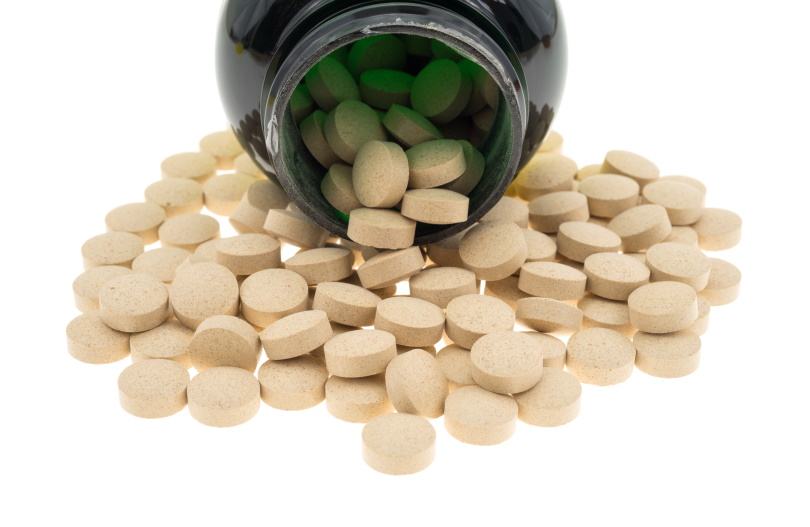Click to Skip Ahead
Brewer’s yeast is one of the most popular natural supplements for dogs on the market today, as proponents swear that it does a world of good for your pooch in a variety of ways.
If you’re just now learning about this natural health boost for your dog, then it’s worth educating yourself on all the ways to use it, as well as its potential risks and benefits.
Fortunately, we assembled all that information for you, and all you have to do is read on.
Brewer’s Yeast Benefits for Dogs
Brewer’s yeast has a surprising array of benefits for dogs and humans alike. But let’s just focus on everything that it can do for your pooch.
Skin Health
Brewer’s yeast is full of B vitamins — specifically, B1, B2, B3, B5, B6, B7, and B9. These nutrients are essential for maintaining the integrity of the skin barrier function. If your dog doesn’t get enough of them, they can develop dry, flaky skin, as well as alopecia, anorexia, and pruritus.
Coat Quality
There are a ton of antioxidants inside brewer’s yeast, including the all-important omega-3 and omega-6 fatty acids. These contribute to a shiny, lustrous coat, while the B vitamins also help keep your dog’s hair strong and less prone to breaking or falling out.
Eye Health
Those same antioxidants also protect your dog’s eyes from damage, helping prevent cataracts, stave off retinal diseases, and prevent glaucoma. As a result, brewer’s yeast is especially good for older dogs, but for best results, you should give it to your pup before their eyesight starts to fade.

Liver Function
Scientists are beginning to experiment with using B vitamins to improve liver health and manage disease. Brewer’s yeast is full of B vitamins, so it may be able to help with reducing cell damage from free radicals, restoring nutrient depletion, and improving vitamin absorption.
Anxiety Reduction
B vitamins are essential for the creation of serotonin, which is a “feel-good” neurochemical that can make your dog happier and less anxious. Be aware, though, that brewer’s yeast can interact with certain anti-anxiety medications, so if you’re already treating your dog for this condition, you’ll want to consult your vet before giving brewer’s yeast to your pup.
Diabetes Control
This one’s a bit controversial. The chromium in brewer’s yeast has been shown to improve the body’s tolerance of glucose and its use of insulin in humans, but there have yet to be any corresponding studies in dogs. However, there’s plenty of anecdotal evidence suggesting that it may help dogs regulate their blood sugar levels effectively.
It may interact with diabetes medications, though, causing a dangerous drop in insulin levels, so ask your vet before you start adding brewer’s yeast to your dog’s diet.
Cell Function
The B vitamins in brewer’s yeast help your dog’s cells convert food into energy, giving your dog more pep and causing their cells to work more efficiently. The antioxidants in the yeast also protect the cells from oxidation and other free radical damage, which can have a wide variety of benefits on the cellular level.

Improve Digestion
Brewer’s yeast is full of probiotics, which are healthy bacteria that line the intestinal tract and aid in the digestion of food, absorption of nutrients, and prevention of disease. This can make it an excellent choice for dogs with sensitive stomachs or those suffering from diarrhea or other digestive troubles.
Build Lean Muscle Mass
Protein makes up 52% of the mass of brewer’s yeast, making it a great way to help your dog build lean muscle. The protein should also help your dog feel full for longer, which can help with weight loss.
Parasite Prevention
Adding brewer’s yeast to your dog’s food may help your dog repel fleas and ticks. How does it work? We don’t actually know, but it seems more effective when paired with omega-3 oils, so you may want to mix it with fish oil or a similar supplement. Regardless, you should treat the parasite prevention as a bonus rather than relying on it as your sole choice for parasite prevention.
Also, check the ingredients list on any brewer’s yeast supplement that’s been specifically marketed for flea and tick control. Many of these pair the yeast with garlic to improve potency, but unfortunately, garlic is toxic to dogs.

Uses for Brewer’s Yeast
Now that we’ve seen all the benefits that brewer’s yeast can have for your dog, how do you get your dog to take it? You have a few options.
Add It to Their Food

Many brewer’s yeasts are sold as powders, so all you have to do is mix it in with your dog’s food and add water. It can have a bitter taste, though, and some dogs don’t care for it. Brands do sell de-bittered brewer’s yeast, but that will have the chromium removed, robbing it of many of its nutritional benefits.
Give Them a Pill
There are also brewer’s yeast pills or capsules that you can give your pup. These may be easier to give your dog, as you can hide them in a treat or cover them in peanut butter. It’s also easier to control the dosage amount with a pill.
Toss Them a Chewable

You can also find chewable brewer’s yeast tablets. These are easy to use, but it may be difficult to convince your dog to eat them, due to the bitter taste.
Side Effects of Brewer’s Yeast on Dogs
While brewer’s yeast has quite the list of benefits for dogs, that doesn’t mean it’s without its drawbacks. Let’s take a look at the potential side effects that you can see with this supplement.
Upset Stomach
While brewer’s yeast can be used to soothe upset stomachs, some dogs don’t tolerate it well. For them, the supplement can actually cause digestive problems, which completely defeats the purpose.
You should monitor your dog closely for a few days after you start giving them brewer’s yeast to make sure they’re not vomiting, suffering from diarrhea, or dealing with other signs of gastrointestinal distress.
Yeast Infection
This might seem obvious, but brewer’s yeast is, in fact, yeast. That’s not a problem for most dogs, but if your pooch is immunocompromised, prone to yeast infections, or allergic to yeast, they should not be given brewer’s yeast.
If you’re not sure how your dog will react to yeast, watch them closely after giving them the supplement to make sure they don’t break out into rashes or develop dry, itchy skin. If they do, discontinue use of the brewer’s yeast immediately and contact your veterinarian.

Weight Gain
Brewer’s yeast is a calorie-dense food, so if you start giving it to your dog regularly, you’ll need to cut out calories elsewhere if you don’t want them to gain weight. You can also try to increase their activity level to counteract their increased caloric intake.
Interference With Medications
If your dog is on any prescription medications, you should consult your vet before you start giving brewer’s yeast to your pup. It’s been known to interact poorly with certain medications, most notably anti-anxiety meds or those used to treat diabetes.
Bloat
Bloat is a serious, potentially fatal disease that’s caused when your dog’s stomach fills with gas, food, or liquid and then twists itself. As brewer’s yeast ferments in your dog’s stomach, it can cause it to fill with gas, increasing the risk of bloat.
Broad-chested breeds like Great Danes or Mastiffs are more prone to bloat than others, but any dog can be afflicted. To reduce the risk of bloat, start with small amounts of yeast and build up gradually once you’re sure your dog can tolerate it well.
Is It Time to Start Giving Brewer’s Yeast to Your Dog?
Brewer’s yeast has powerful benefits for dogs, but it also has drawbacks that need to be carefully considered before you start giving it to your pooch. It’s also essential that you discuss your plan with your vet before you start your dog on a new supplement regimen.
Adding brewer’s yeast to your dog’s diet may end up being just what the vet ordered, and if you’re a fan of using natural remedies to treat common problems, it could be exactly the solution that you’ve been looking for.
Featured Image Credit: _Javier Brosch, Shutterstock













